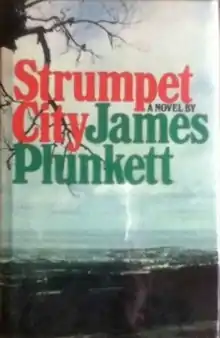Strumpet City
Strumpet City is a 1969 historical novel by James Plunkett set in Dublin, Ireland, around the time of the 1913 Dublin Lock-out. In 1980, it was adapted into a TV drama by Hugh Leonard for RTÉ, Ireland's national broadcaster. The novel is an epic, tracing the lives of a dozen characters as they are swept up in the tumultuous events that affected Dublin between 1907 and 1914.
 First edition | |
| Author | James Plunkett |
|---|---|
| Country | Ireland |
| Language | English |
| Genre | Historical fiction |
| Publisher | Hutchinson |
Publication date | 1969 |
| Pages | 576 |
| ISBN | 0-09-918750-7 |
The Risen People
The novel's roots date from 1954, when Plunkett's radio play Big Jim was produced by Radio Éireann, with Jim Larkin the titular hero.[1] In 1958, it was expanded into a gloomier and more stylized stage play, The Risen People, staged at the Abbey Theatre.[1] Kathleen Heininge characterises it as a dry work which read as "pure propaganda for a socialist agenda".[2] When Hutchinson requested a novel about James Connolly from Plunkett, he reworked the play again; Connolly does not feature in Strumpet City, published in 1969. The Risen People was revived and revised in 1977 for the Project Arts Centre and Jim Sheridan.[3] A 2013–14 revival at the Abbey included "the Noble Call", a speech in response to the play's themes from a different public figure at each performance.[4] Panti Bliss' speech on LGBT rights in Ireland at the closing performance attracted media attention.[5][6]
Reception
It was immensely popular when it was published. The writing is direct and powerfully evokes the over-population, the terrible poverty and the peculiar intimacy of pre-independence Dublin. One theme is the essential goodness of people and the tenderness which survives the brutality of deprivation. The popularity of the novel also owed something to events in Ireland in the early 1970s, as The Troubles made the more traditional iconography of the insurrectionary period troublesome, while economic stagnation and social crisis fostered empathy for the former Dublin of tenements, working class heroes and vagrant balladeers.
In 2013 Dublin City Libraries chose Strumpet City as its 'One City One Book' book of the year, in commemoration of the centenary of the 1913 Lockout.[7][8]
On November 5, 2019, the BBC News listed Strumpet City on its list of the 100 most influential novels.[9]
References
- Freitag, Barbara (1 January 1995). "Literature rewrites history: James Connolly and James Larkin Larger than Life". In Leerssen, Joseph Theodoor; Weel, Adriaan van der; Westerweel, Bart (eds.). Forging in the Smithy: National Identity and Representation in Anglo-Irish Literary History. International Association for the Study of Irish Literatures (IASIL) Leiden 1991: Volume 1 of The Literature of Politics and the Politics of Literature. Costerus New Series. Vol. 98. Rodopi. p. 243. ISBN 978-90-5183-759-9. Retrieved 24 May 2015.
- Heininge, Kathleen (2009). Buffoonery in Irish Drama: Staging Twentieth-century Post-colonial Stereotypes. Peter Lang. p. 168. ISBN 978-1-4331-0546-3. Retrieved 24 May 2015.
- Murray, Christopher (2000). Twentieth-Century Irish Drama: Mirror Up to Nation. Syracuse University Press. p. 181. ISBN 978-0-8156-0643-7. Retrieved 24 May 2015.
- "The Risen People". Abbey Theatre. 2013. Archived from the original on 26 October 2014. Retrieved 24 May 2015.
- "Panti's rousing gay rights speech goes viral". BreakingNews.ie. 5 February 2014. Retrieved 24 May 2015.
- Connolly, Shaun (8 February 2014). "Buttimer and Panti drown out empty rhetoric in homophobia debate". Irish Examiner. Retrieved 24 May 2015.
- "Strumpet City is Dublin City Libraries' One City, One Book Choice for 2013". Gill Books. Retrieved 15 October 2022.
- "Strumpet City". One Dublin One Book. Retrieved 15 October 2022.
- "100 'most inspiring' novels revealed by BBC Arts". BBC News. 5 November 2019. Retrieved 10 November 2019.
The reveal kickstarts the BBC's year-long celebration of literature.
External links
- Strumpet City is discussed in an obituary for James Plunkett in the Irish Independent
- Eileen Battersby asks: "Is Strumpet City the great Irish novel?" in The Irish Times
- 'Strumpet City': the impossible Irish novel Edited introduction by Fintan O'Toole to new edition of Strumpet City